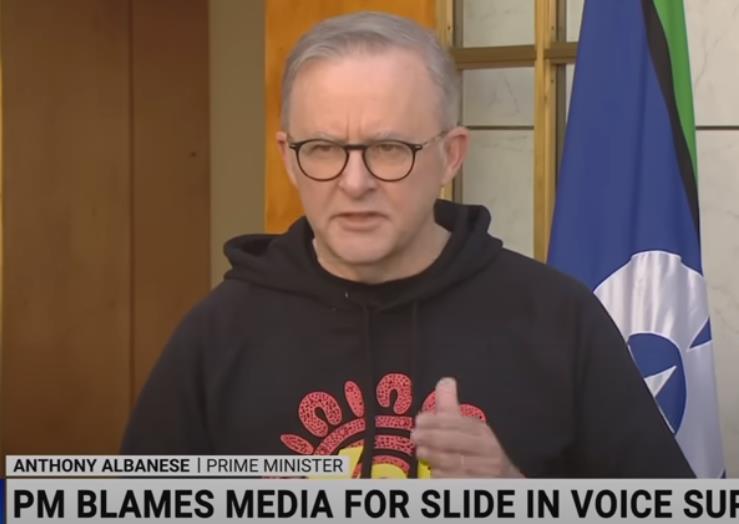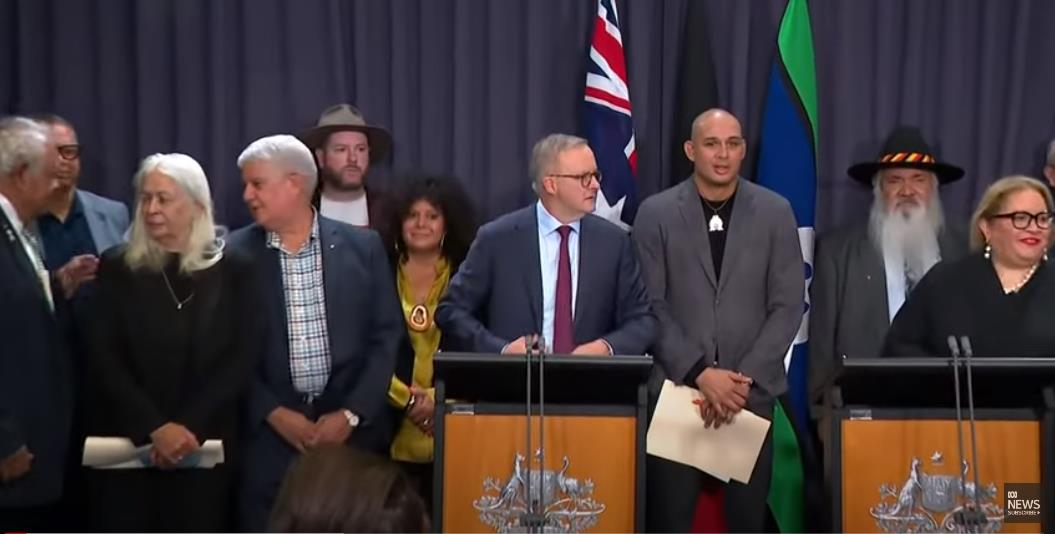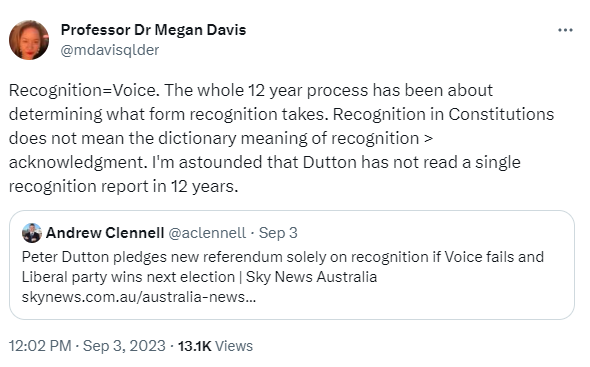The vexing question of 'recognition'
For future reference: This post relates to the 2023 Aboriginal and Torres Strait Islander Voice Referendum
WARNING: In this article I rewrite parts of the question and amendment for the upcoming 2023 referendum. Constitutional experts may clutch their pearls. Don't stress. The intent is not to create new or better versions, but rather to probe and understand the existing version.
TL;DR: The term 'recognition' in the upcoming Voice Referendum is used in an attempt to enshrine both symbolic and practical benefits. This has led to unintentional ambiguity for layperson readers. An unnecessary overreach like this could have, and should have, been avoided.

Prime Minister Albanese has been at pains to stress the simplicity of the question being asked of the Australian people in the 2023 Aboriginal and Torres Strait Islander Voice Referendum.
Speaking recently1, he said:
❝I'd encourage newspapers out there.... here's an idea, put on the front page what the question is before people that they're being asked to do, because it's a simple proposition. It's not about a range of things that are being asked in the parliament. It's not about a range of the misinformation which is there. It's about a very clear proposition. ❞
(emphasis mine)
With due respect to the PM, I'd like to suggest that reading the proposition is not as simple as he indicates. Certainly not for laymen such as myself, and perhaps not even for constitutional experts.
As Albanese suggests, let's look at the "very clear proposition"2.
Referendum question
“A Proposed Law: to alter the Constitution to recognise the First Peoples of Australia by establishing an Aboriginal and Torres Strait Islander Voice.
Do you approve this proposed alteration?”
Constitutional amendment
“Chapter IX Recognition of Aboriginal and Torres Strait Islander Peoples
129 Aboriginal and Torres Strait Islander Voice
In recognition of Aboriginal and Torres Strait Islander peoples as the First Peoples of Australia:
- there shall be a body, to be called the Aboriginal and Torres Strait Islander Voice;
- the Aboriginal and Torres Strait Islander Voice may make representations to the Parliament and the Executive Government of the Commonwealth on matters relating to Aboriginal and Torres Strait Islander peoples;
- the Parliament shall, subject to this Constitution, have power to make laws with respect to matters relating to the Aboriginal and Torres Strait Islander Voice, including its composition, functions, powers and procedures.”
(emphasis mine)
I have highlighted variants of the word "recognise" in the above text. For me this word is particularly problematic. Try as I might, I struggle to assign unambiguous meaning to the sentences that contain it.
Most people have some concept of what "recognition" means. Dictionaries provide various definitions3. Common ones include:
- identification of someone or something from previous encounters or knowledge.
- acceptance of the existence, validity, or legality of something.
- a token of thanks or acknowledgment.
- an expression of admiration and respect for achievements.
When you hear talk of recognizing First Nations peoples in the Australian Constitution it is natural to think that one or more of these definitions will be applicable.
If so, "recognizing" First Nations peoples boils down to some sort of symbolic acknowledgement. Presumably to make indigenous people feel good about themselves. Or maybe to make non-indigenous people feel good about themselves. Or perhaps both.
It's rational to think this.4 We have been hearing talk of constitutional recognition at least since the days of John Howard. We've even had a referendum that attempted to do it. And this symbolic acknowledgement was (I think) the type of recognition then envisaged.
The thing is, Aboriginals have been pretty clear that they don't want this type of recognition.5 6 7 8
They want something practical.
🧩🧩🧩🧩🧩🧩
So, can the proposal be read as containing symbolic recognition?
The question asks us if we will approve a law "to recognize" the First Peoples of Australia by [creating the Voice].
The amendment speaks about [creating the Voice] "in recognition of" Aboriginals.
Objectively, the sense the word is being used in can't be known without reference to further context. At first glance, my (layman/literal) reading of the question suggests it is asking me to identify and acknowledge Aboriginal and Torres Strait Islander (ATSI) people as the First Peoples of Australia. This interpretation seems questionable in context: it is not obvious why identifying and acknowledging a fact leads to any further action (such as creating the Voice).
The amendment title offers little to aid interpretation.
The amendment itself reads as if we are creating the Voice "in appreciation" of ATSI people for being the "First Peoples of Australia". Although in this case I'd expect:
In recognition of Aboriginal and Torres Strait Islander peoples for being the First Peoples of Australia:
Perhaps it should be read to be identifying/acknowledging ATSI peoples as the First Peoples of Australia. In this case I'd expect:
In recognition of Aboriginal and Torres Strait Islander peoples as being the First Peoples of Australia:
The latter is closer in wording to the actual, yet this interpretation suffers contextually in the same way my reading of the question did; it should be complete without further action. My attempts at literal, everyday interpretations seem to fall flat. If forced to choose between the two options, I'd probably interpret "recognition" here (in combination with the remainder of the amendment) as indicating the Voice to be a "reward" given to ATSI people for being the First Peoples of Australia.
📜📜📜📜📜📜
ngl. I think the results of my logic are unsatisfactory. However, if I were close to the mark then the updated question and amendment perhaps could be rewritten:
Referendum question
“A Proposed Law: to reward the First Peoples of Australia by altering the Constitution to establish an Aboriginal and Torres Strait Islander Voice.
Do you approve this proposed alteration?”
Constitutional amendment
“Chapter IX Appreciation of Aboriginal and Torres Strait Islander Peoples
129 Aboriginal and Torres Strait Islander Voice
In appreciation of Aboriginal and Torres Strait Islander peoples as the First Peoples of Australia:
- there shall be blah, blah, blah...”
Maybe....?
📣📣📣📣📣📣
This tweet caught my eye.
❝Recognition in Constitutions does not mean the dictionary meaning of recognition > acknowledgment.❞
I'm not sure what '>' means in this context. An arrow? A 'greater than' sign? Something else? (oh, how I love tweets). I'm going to assume she means "Recognition in Constitutions does not mean acknowledgment".
At any rate, Prof. Davis seems adamant that answers should not be sought in a dictionary.
The equation "Recognition=Voice" is succinct, but there is no hint as to the reasoning.
🖋️🖋️🖋️🖋️🖋️🖋️
The best source I have found for trying to understand Constitutional issues regarding the Voice is the Constitutional Clarion. This is a YouTube channel featuring Prof. Anne Twomey.
In (at least) one of her videos Prof Twomey explains9 that the "recognition" relevant here is similar to that where you are "recognized" in a meeting. That is to say, you are allowed to speak. Put another way, when in a meeting and officially recognized by the meeting chair, your voice will be heard without interruption.
This makes some sense to me. For ATSI people to be "recognized" (allowed to be heard) there first must be a practical mechanism by which they can be heard (the "Voice").
If I was to write the referendum question and amendment in a way that made sense to me (based on this interpretation) it might look like:
Referendum question
“A Proposed Law: to alter the Constitution to allow recognition of the First Peoples of Australia by establishing an Aboriginal and Torres Strait Islander Voice.
Do you approve this proposed alteration?”
Constitutional amendment
“Chapter IX Recognition of Aboriginal and Torres Strait Islander Peoples
129 Aboriginal and Torres Strait Islander Voice
To facilitate recognition of Aboriginal and Torres Strait Islander peoples, the First Peoples of Australia:
- there shall be blah, blah, blah...”
📢📢📢📢📢📢
Dunno. While a "recognized to speak" interpretation makes sense to me, the actual wording of the question and amendment don't obviously support that interpretation (for me at least).
I'm at a bit of an impasse there.
Furthermore, if the "recognized to speak" interpretation is correct it leads to an odd place.
We know that the Australian public has considerable history with the word "recognition" in the context of First Nations people and the Constitution.
However, [if we set aside the minority who have closely followed USFTH issues] this has been largely in relation to symbolic recognition. That is to say, recognition as defined in more commonly-understood, dictionary-standard, terms.
The framers of this amendment surely would have foreseen the confusion that could arise by using this term. Confusion and uncertainty are things I am confident they did not want.
It's worth noting what Albanese said at the 2022 Garma festival
❝We should consider asking our fellow Australians something as simple as 'Do you support an alteration to the constitution that establishes an Aboriginal and Torres Strait Islander Voice?' ❞
Note there is no hint of the word "recognise". Why didn't they run with this?
I will risk ridicule and have a crack at my own version using the "don't use the word 'recognise'" approach.
Referendum question
“A Proposed Law: to alter the Constitution by establishing an Aboriginal and Torres Strait Islander Voice that allows the First Peoples of Australia to be heard.
Do you approve this proposed alteration?”
Constitutional amendment
“Chapter IX Listening to Aboriginal and Torres Strait Islander Peoples
129 Aboriginal and Torres Strait Islander Voice
So that the voices of Aboriginal and Torres Strait Islander peoples are heard:
- there shall be blah, blah, blah...”
My meddling would likely give a constitutional expert seizures. Sorry.
The point is, I would assume a more skilled person could retain the intent of the amendment without resorting to the term "recognition".
If so, it is worth pondering why this was not done.
Someone, (despite the views of ATSI people, and the protestations of Twomey and Davis) was invested in the idea of symbolic recognition.
Albanese's announcement of the referendum wording confirms this.10
❝The Constitutional Provisions we are releasing today enshrine two fundamental principles: recognition and consultation.
First recognition: as Australians we have an extraordinary privilege, we share this great island continent with the world's oldest continuous culture. Our nation's birth certificate should recognize this and be proud of it. People who have loved and cared for this country for 65000 years, and more, in countless ways. We embrace that as a source of great pride, and we should recognize it, we should recognize it.
Secondly: Consultation. Not a radical notion, a sensible and practical proposition that Aboriginal and Torres Strait Islander people should have a say in the decisions and policies that affect their lives. Not just because it's common courtesy and decency to ask people before you take a decision that will have an impact on them, but because when you reach out and listen to communities you get better results.❞
(emphasis mine)
It is difficult to read this and not draw the conclusion that the recognition Albanese speaks of is both symbolic, and consistent with normal dictionary definitions of the word.11
Perhaps now we understand the origins of the difficult referendum wording. The word "recognize" has been co-opted for both "symbolic" and "practical" purposes.
As is normally the case when two masters are being served, the result proves problematic.
At the very least, this has resulted in referendum wording that does not support claims of "simplicity".
Perhaps more problematic (from a Yes camp perspective) is that yet again the opportunity for FUD12 is introduced. Is "recognition" used to influence voters into thinking that Referendum outcomes are only symbolic? That symbolic recognition is (despite indigenous indifference) seen as relatively popular could provide motive.
Are there any legal issues that arise from providing referendum wording that could potentially be argued as deceptive?13 I have no idea, it is not relevant to me. Prof. Anne Twomey offers her thoughts here. My intent is to examine the issue as a layman. This, after all, is what every Australian is currently being asked to do.
🗳️🗳️🗳️🗳️🗳️🗳️14
Ultimately, we are left with referendum wording that (IMHO) could lead to doubt and uncertainty.
I can't imagine that was the intent. The forced enmeshing of concepts (symbolic vs practical recognition) seems completely unnecessary. It is hard to fathom why this has been attempted, particularly when indigenous peoples do not appear to have asked for it.
If the referendum passes, this overreach may well be considered a stroke of genius.
However, from the vantage point of current polling it is difficult not to look at this and ponder terms like "self-sabotage" and "tactical blunder".
🧍🏼♂️🧍🏻♂️🧍♂️🧍🏽♂️🧍🏾♂️🧍🏿♂️
Sky News Australia: Anthony Albanese ‘partly blames’ the media for slide in support for the Voice. For similar sentiment see "The question that Australians will be asked at this year's referendum is a very simple one...."↩
https://voice.gov.au/referendum-2023/referendum-question-and-constitutional-amendment↩
Cambridge Dictionary, Merriam-Webster, Collins Dictionary, dictionary.com, Oxford Learner's Dictionaries↩
Those closely involved in recognition efforts over the past decade may dispute this. They have become accustomed to using the word in a starkly different sense. However, let me point out that this reassignment of meaning has little traction outside of this small and specialized group.↩
Constitutional Clarion: Voice and Recognition - should there be one referendum question or two?↩
"... Aboriginal and Torres Strait Islander communities have made it clear that they seek substantive and practical recognition". Referendum Council. Discussion Paper on Constitutional Recognition of Aboriginal and Torres Strait Islander Peoples↩
Uluru talks: Indigenous Australians reject 'symbolic' recognition in favour of treaty. The Guardian, 2017.↩
"Indigenous peoples call for substantive constitutional recognition but the politicians hear ‘symbolic’ recognition." Griffith Review. The long road to Uluru.↩
Constitutional Clarion: Indigenous Voice Constitutional Amendment - Product Review↩
ABC News: Anthony Albanese announces wording of referendum question on Indigenous Voice to Parliament↩
As an aside, I will note the the person in the far right of the above image is Megan Davis. Her presence in the room when this statement was made makes interpretation of her "not dictionary meaning" tweet even harder. And if she thinks interpreting "recognition" by recourse to a dictionary means Dutton has not read a recognition report in 12 years, where does that leave Albanese?↩
news.com.au : Voice referendum question likely ‘misleading, unconstitutional’, legal experts warn [also this legal opinion]↩
If the ballot box emojis I have used have ticks ✅ on them please do not be mad at me! 😆 Write 'YES', or 'NO'.↩
